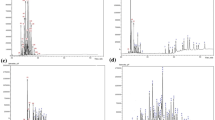Summary
-
1.
The polyisobutylene production unit of Salavat Petrochemical Combine was used to show the possibility of producing various low molecular polybutylenes (octols) by a continuous method with a catalyst complex of aluminum chloride and alkylbenzenes in “complete mixing” reactors designed by Leningrad Scientific-Research and Design Institute of Chemical Machinery.
-
2.
Production of the following was demonstrated:
-
a)
Octol-600 in one step.
-
b)
Octol starting material for succinimide additives with a viscosity of 148–179 cS at 100° in two stages.
-
c)
Cable grade octol with the viscosity of 78–101 cS at 100° both in one-and two-step polymerization of a butane-butylene fraction.
-
3.
The aqueous-alcoholic caustic solution used for deactivation of catalyst and neutralization of hydrogen chloride ensured neutrality and a high quality of the octols obtained.
Similar content being viewed by others
Additional information
A. Yu. Yanu, A.A. Dolzhskovoi, and F. F. Prokhorenko participated in this study.
Translated from Khimiya i Teknologiya Topliv i Masel, No. 12, pp. 21–25, December, 1971.
Rights and permissions
About this article
Cite this article
Prokof'ev, K.V., Kazanskii, V.L., Yudakova, L.P. et al. Experimental industrial production of low-molecular polybutylenes (octols). Chem Technol Fuels Oils 7, 911–915 (1971). https://doi.org/10.1007/BF00716583
Issue Date:
DOI: https://doi.org/10.1007/BF00716583



